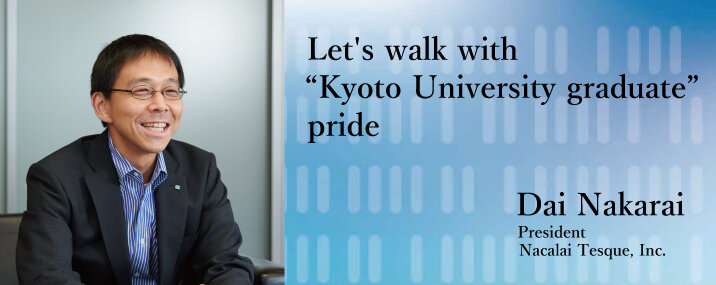Vol.21 Interview with Donors

Dai Nakarai
Born in Yamagata Prefecture in 1976. After graduating from the Faculty of Law, Kyoto University, in 1999, began managing a cram school. Joined Nacalai Tesque in 2011 and has been in his current position since 2013.
Q Please tell us some memories from your days at Kyoto University.
Many people from Yamagata prefecture, where I was born, go on to universities in the Kanto area, but I chose Kyoto University because many of the messages from current students in Akahon (collection of past test problems, etc. for various universities) were simple and nonchalant, and they piqued my interest. I like to keep my own pace and make decisions for myself, so the freedom of Kyoto University seemed attractive.
My choice of faculty was also a bit casual; I thought if I had to choose from liberal arts, maybe law. Throughout the four years there, I kept my relaxed manner in studying and playing. I think that through having to allocate my resources to studying, playing, etc. on my own, I acquired a sense of balance.
At the time of enrollment, I could only speak the Yamagata dialect, so I watched manzai or Japanese double act comedy so that I could learn to keep up with the tempo of the Kansai dialect. I also wanted to befriend the comedian Mr. Fuminori Ujihara, who was in my class, but we never became close friends. I was in one of the tennis clubs, but my hands held a lot more mahjong tiles than rackets. Those days were filled with fun and fond memories.
My friends with whom I spent my days are all now flourishing in important positions. The main focus of students should naturally be studying, but in the case of Kyoto University students, I think they only reveal their true selves after graduating and reaching their potential.
Q Why did you start a cram school in your hometown after graduating?
My fishermen parents wanted me to come home, and I wasn't very interested in job hunting or a 9-5 job, so I decided to go back home to maybe study for the bar exam. I was working part-time at a cram school while helping with the family business, but in the end I came up with the idea of "let's run it myself." I struggled for the first year or two, but it soon started to do well, and in the end I transferred the school to a company that has a chain of cram schools.
I met my wife through an older friend from Kyoto University, which prompted me to return to Kyoto and join the current company. My life changed drastically both publicly and privately, and nothing was familiar. But because of my optimistic personality, I think I was able to maintain a positive attitude of "it'll work itself out" in any situation.
Looking back, I do sometimes think that I should have managed the cram school another way, or I should have exposed myself to a more academic atmosphere when I was in college. But isn't that always how it is? Ten years from now, I will probably look back to now and think about something I should have done but didn't. So, you should pursue challenges related to whatever you're interested in or you need to do at each moment.
Acquired knowledge will be forgotten if it's not needed for your current job, and besides, knowledge isn't everything. I think that the personal connections I built as a student and the manner of speech and behavior I acquired during my cram school years are more useful to me now.
Q On the 125th anniversary of its founding, please tell us your hopes for
Kyoto University and send a message to Kyoto University students.
As a reagent supplier based in Kyoto, we look forward to "strengthening research capabilities" in the 125th anniversary project, and we would like to help enliven Kyoto University, which is indispensable for the identity of Kyoto.
The appeal of Kyoto University is its diversity and encompassing capacity. You can find various types of students and researchers, and there is an environment where you can devote yourself to what you like. There are domains that receive priority in government support, and then there are other "interesting research projects"; Kyoto University is a place that values such projects. I would like the University to equally support even dark horse projects that may seem useless. That will serve as the centripetal force of Kyoto University that pulls in more and more outstanding students and researchers.
In my varied life, it has been my pride to be a graduate of Kyoto University. After joining my current company, I studied at Harvard Business School and a university in Tokyo, but I was never afraid; instead, the mixed sense of responsibility and tension stemming from the thought that "I have the potential of a Kyoto University graduate. I will strive to make good that name" helped me grow.
You're only a Kyoto University student for a few years, but you will be a Kyoto University graduate for the rest of your life. Please walk through life with pride and your head held high.
(Interviewed in August 2020)


